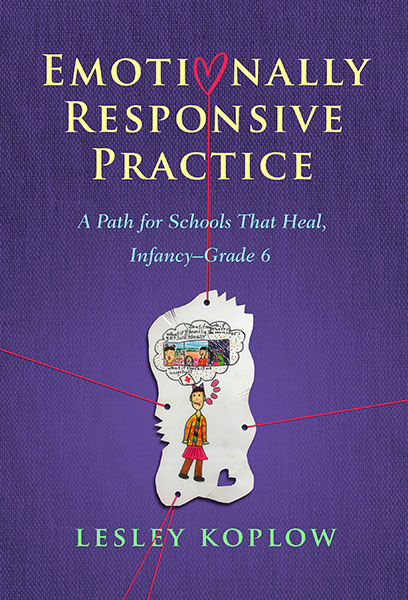Professors: Request an Exam Copy
Print copies available for US orders only. For orders outside the US, see our international distributors.
Publication Date: January 8, 2021
Pages: 168

It is essential for all schools to integrate trauma-informed care into practice as children, parents, and teachers live with the threat of COVID-19. In her new book, Lesley Koplow explores the Emotionally Responsive Practice (ERP) approach designed to support children and teachers’ emotional well-being in the public-school setting. ERP encourages school staff to look at children through the lens of child development, as well as through the lens of their life experiences, in order to help them resolve foundational social and emotional milestones. Unlike many SEL programs, ERP asks adults to consider the ways that educational philosophy and school climate impact emotional, social, and cognitive outcomes for young children. This timely resource offers teachers, school leaders, and school-based clinicians a vision and blueprint for engaging in relationship-based, trauma-informed practice in early childhood and elementary school grades.
Book Features:
Lesley Koplow, LCSW, is the director of the Center for Emotionally Responsive Practice at Bank Street College in New York City. Her books include Unsmiling Faces: How Preschools Can Heal, Second Edition, Creating Schools That Heal: Real-Life Solutions, and Bears, Bears Everywhere! Supporting Children’s Emotional Health in the Classroom.
“This volume will serve readers across private and public educational settings as a valuable contribution to the foundational literature on education and child development.”
—CHOICE
“Lesley Koplow is a passionate advocate for young children and their educators. She writes with a deep understanding of early childhood, mental health, trauma and recovery, the latest advances in neuroscience, and the healing power of emotionally responsive relationships. She reminds us that the core of education is the child-teacher relationship where we need to meet children where they are. She calls upon us to redefine the Common Core as promoting social and emotional development and the necessity of ensuring safety in the hearts and minds of children and those who care for and teach them.”
—Gerard Costa, director, Center for Autism and Early Childhood Mental Health and professor, Montclair State University
“Lesley Koplow teaches us how to create schools that meet the needs of today’s children. Emotionally Responsive Practice is wise and practical, grounded in developmental theory and the experiences of children living through the most challenging of times. Read, reflect, and take up the tools to build better schools and futures for all our children.”
—Jonathan Silin, educator, author, and activist
“Lesley Koplow’s book reminds us of the most basic premise of education: that children, teachers, and school leaders are humans working to make sense of a complicated world alongside one another. She offers not a prescriptive program but a series of creative, productive road maps for bringing adults and children closer together, and for making space for children to use school as a place to work through questions, feelings, and visceral reactions to the strange and often painful conditions they have inherited.”
—Clio Stearns, assistant professor of education, Massachusetts College of Liberal Arts
“This is a wisdom-filled book from start to finish and an invaluable resource at a time of nationwide crisis. Emotionally Responsive Practice provides a clear roadmap for how schools can be environments that tend to the needs of all who walk through their doors—the teachers who strive mightily to create safe and learning-filled classrooms even in the face of multiple stressors, and the many vulnerable children whom those teachers work with every day to support emotionally, developmentally, and cognitively.”
—Deborah Hirschland, early childhood mental health consultant and author
Contents
Acknowledgments
Preface
Part I. The Smallest Circle— The Biggest Umbrella
1. The Promise of Public School: Emerging From a Checkered Past
Learning in Time: History, Politics, Education, and Child Mental Health
Supporting Social and Emotional Development in School
2. Looking Through the Lens of Development
Supporting Developmental Foundations for Group Life
The Age of Opportunity
First Things First: Essential Milestones for Healthy Development
Assessing Potential to Nurture Learning
3. Looking Through the Lens of Experience
Life Experiences and the Developing Brain
The Mask of Behavior
The Value of Life Story:: A Core Concept of Emotionally Responsive Practice
Part II. The Good Mirror and Other Tools of Emotionally Responsive Practice
4. Using Reflective Technique in School
Reflective Language as “Good Mirror”
Reflective Literacy as a “Good Mirror”
5. Inviting and Containing the Voices of Children in School
Emergent Curriculum: Literacy, Social Studies, and Art
“Ghost-busting” in Shared Spaces
Too Much, Not Enough, Just Right
Inviting and Containing in Work with Families
6. Feeling Safe Changes Everything: ERP as Trauma-Informed Care
Trauma Comes to School
Recognizing and Responding to Trauma’s Voice
Building Infrastructure for Trauma-Informed Care
Erasing the Gap: Redefining What Counts
Part III. Real and Pretend: Fighting for Children’s Right To Well-being
7. Freedom to Think, Feel, and Play: Developmental Foundations of Emotional Health
Freedom to Think, Freedom to Play
Once Upon a Time and the Freedom to Learn by Playing
8. Umbrellas for Teachers and Leaders
“Little Self”” Comes In
More than Words: Story, Magic, and Metaphor in Teacher Support
Access and Support for Strengthening the Inner Circle
Epilogue
Appendix
References
Index
About the Author
2022 Delta Kappa Gamma Educators Book Award Honorable Mention
Professors: Request an Exam Copy
Print copies available for US orders only. For orders outside the US, see our international distributors.